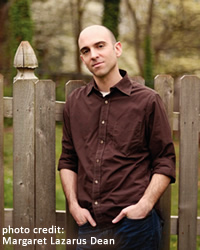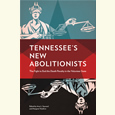The Weight of Blood and History
Veteran novelist Madison Smartt Bell talks with debut novelist Christopher Hebert about the lush landscape and irrepressible people of Haiti
Christopher Hebert’s first novel, The Boiling Season, is set in an unnamed Caribbean country quite strikingly reminiscent of Haiti. This debut novel by an American writer appears to draw on the best of twentieth century Haitian literature to create this at first pastoral, then ultimately dystopian parable. One feels the weight of the tropical air in reading this book, and the weight of blood and history behind it.
As an undergraduate at Antioch College, Hebert worked on The Antioch Review; as an M.F.A. candidate at University of Michigan, he won a Hopwood Award for fiction. He has traveled extensively in Central America, and now teaches in the English department at the University of Tennessee at Knoxville.
Madison Smartt Bell: When I first saw the galley of your novel I was struck by the odd coincidence that you share the nom de famille, Hebert, of the French protagonist of my books about the Haitian revolution. I figure you can’t be descended from this fictional character, but do you have a blood tie to Saint Domingue and to Haiti?
 Christopher Hebert: It is a funny coincidence. Especially considering that my French is entirely in name only. Hebert is actually the name of my father’s stepfather. So it comes without any blood link at all. Although no one, to my knowledge, has traced the genealogy yet, I suspect these Heberts are more likely Northern stock. Over the years I’ve periodically threatened to restore the family’s lost accent aigu. If I were ever going to do that, though, I guess this book would have been the time.
Christopher Hebert: It is a funny coincidence. Especially considering that my French is entirely in name only. Hebert is actually the name of my father’s stepfather. So it comes without any blood link at all. Although no one, to my knowledge, has traced the genealogy yet, I suspect these Heberts are more likely Northern stock. Over the years I’ve periodically threatened to restore the family’s lost accent aigu. If I were ever going to do that, though, I guess this book would have been the time.
Bell: The setting of your book reminds me very much of Habitation Leclerc, a plantation ostensibly owned by Napoleon Bonaparte’s sister Pauline, which became a fantastically luxurious hotel during the Duvalier regime, and was later owned by the dancer Katherine Dunham. I visited the place in the late 1990s, when Port au Prince had more or less grown around it, and it had been squattalizé by the locals. It had a strange numinosity, in part because of the old-growth trees it still contained, that you evoke in your setting. I wondered if Habitation Leclerc was a model for you, and what your connection to that place might be.
Hebert: Absolutely. Habitation Leclerc was both my model and my inspiration. And what you mention seeing there was precisely what I found so fascinating about the place. I was introduced to it purely by chance, at a moment when I knew very little about Haiti. I wasn’t looking for this story, but when I came upon it I immediately recognized it as the convergence of a lot of different things I was fascinated in.
I was actually in the middle of working on a very different novel at the time. The other novel was in part about a cell of underground political activists in the U.S. It was set in the present day, and it was inspired by an interest in radical political figures and various movements in American history. As a writer, I have very little tolerance for ideology, but I have an abiding fascination for people who choose to take on difficult struggles. In 2002, while I was still in the process of writing this other book, I happened to read an article in The New York Times. It was titled, “In Katherine Dunham’s Eden, Invaders from Hell.” The romantic dichotomy between Eden and Hell was hard to resist.
 It turned out that the “Eden” was the now defunct resort you mention, which also happened to be the site of the country’s last tiny remnant of tropical rainforest. The context for the story was Haiti’s ongoing social and political struggles, and also the terrible environmental destruction it was facing. For a variety of reasons, the once-lush tropical landscape had been almost entirely denuded, and Dunham and the estate’s caretakers were trying to preserve the forest. An admirable and understandable goal.
It turned out that the “Eden” was the now defunct resort you mention, which also happened to be the site of the country’s last tiny remnant of tropical rainforest. The context for the story was Haiti’s ongoing social and political struggles, and also the terrible environmental destruction it was facing. For a variety of reasons, the once-lush tropical landscape had been almost entirely denuded, and Dunham and the estate’s caretakers were trying to preserve the forest. An admirable and understandable goal.
The “invaders from Hell” were described as an armed gang. As the title suggested, they were the villains in the story. But even though I didn’t know very much about the island, I had the sense that there was more to it than such a simple dichotomy of good versus evil, Eden vs. Hell. My immediate suspicion, despite the demonizing, was that at least some of those people were—as you say—simply squatting. People just trying to survive. People who needed a place to live, food to eat, water to drink. Basic things, but things that in a turbulent place like Haiti represent a daily struggle.
I started writing this book because I wanted to know what happens when you pit two opposite and opposing, but also understandable, struggles against one another. On the one side, the preservation of something beautiful and virtually extinct. On the other hand, people living in dire conditions struggling to survive. And I wanted to know how these people came to be engaged in these struggles and who they were.
That’s how I came to be interested in Habitation Leclerc. As you can see, it was initially an interest driven by somewhat abstract ideas, and the place was more symbolic than real. But like a lot of people who become curious about Haiti, once I started I couldn’t stop. I put aside my other novel and I began reading everything I could get my hands on: fiction, scholarly tomes, popular histories, travelogues. I couldn’t get enough. I began to see the estate as an incredible vantage point from which to view the entire history of the island. As you say, the links go all the way back to Bonaparte and the Haitian revolution. And then during the reign of Jean-Claude Duvalier, when the political violence and repression achieved a temporary “stability,” the estate was developed into a fabulously decadent place. A favorite of Mick Jagger, apparently.
During one of my early dives into the historical archives, I discovered an article from 1974 (again from the Times) written by someone sent down to cover a party at the resort held to commemorate its opening. The most striking thing about the article is the author’s bewilderment about the jet-setters and society figures gathered poolside in their tuxedos and diamonds, utterly oblivious of the dire poverty and political instability all around them. Even then the slums were exploding.
A lot of denial went into building the resort. I recently came across footage of an interview with the French financier (and nightclub owner) responsible for building the place. This was early on, before it had even opened. The interviewer points out, with obvious dismay, that the resort’s guests, when they arrive on the island, will be traveling by Rolls Royce through the country’s poorest slums. The financier—white bell bottoms, shirtless, his chest covered in gold chains—says it doesn’t matter. His guests are coming to “groove,” and anyway the locals are friendly.
For me, it all started with Habitation Leclerc. From there I became obsessed with country’s history.
 Bell: I went to Habitation Leclerc in the late ‘90s. It’s downhill from the road to Carrefour, and on the turn by the wall of the place there was a pothole situation so dire it would break your axle if you hit it at any speed at all. Word was, the squatters would swarm out by night and rob the cars that bogged down there. They had, of course dug the potholes themselves.
Bell: I went to Habitation Leclerc in the late ‘90s. It’s downhill from the road to Carrefour, and on the turn by the wall of the place there was a pothole situation so dire it would break your axle if you hit it at any speed at all. Word was, the squatters would swarm out by night and rob the cars that bogged down there. They had, of course dug the potholes themselves.
I went into the compound by day; it was easy enough to step through a hole in the wall. Inside there seemed to be a pretty good version of the Haitian lakou way of life. Organized and peaceful. A leader, highly educated, speaking perfect French, came out to talk to me. He was probably twenty years old, a philosophe, which is the degree the Haitian secondary system gives you. On the way out, my Haitian friend who was with me told me he was the head bandit of the whole place and if we’d met by night on that bad turn he’d have taken both our heads off without thinking twice about it.
I don’t reckon Katherine Dunham was the one to develop the place as a hotel. Do you know when she took ownership? Seems to me it must have been later than this seventies phase that you describe.
Hebert: Katherine Dunham was a remarkable woman. She was African-American, born in Chicago, and trained both as a dancer and as an anthropologist. It was as a student anthropologist that she first travelled to Haiti in the 1930s to do ethnographic work. But she became famous later as a dancer and choreographer. She was a leading figure of twentieth-century dance, and for decades she led her own modern troupe, the Katherine Dunham Dance Company, which toured throughout the world. But she developed especially strong ties to Haiti, and in the late 1940s she bought Habitation Leclerc. She wasn’t herself involved in the development of the resort, as far as I know. In the early 1970s, she leased the estate (or at least major portions of it) to Olivier Coquelin, a French entrepreneur who was also the owner of the famously chic Hippopotamus club in New York. He made the hotel a reality, if only briefly.
Bell: The atmosphere of your novel makes me think of Amour, Colere, Folie by Marie Vieux Chauvet, in part because of what could be called, in the abstract, the interaction of oppression and repression. I wonder if she has any influence on you, or if other Haitian writers do.
Hebert: Yes, although I came upon her quite late in the process. Not really until after the new edition appeared in 2009, at which point my book was mostly done. But you’re absolutely right about the similarities in atmosphere. And I think that’s because we share a common interest. Part of what fueled my ongoing fascination with Haiti was realizing the extent to which politics affected the daily lives of ordinary people. Here we have the luxury of choosing not to care about politics. A staggering percentage of Americans can’t be bothered even to vote. Knowing that, it’s bracing to read about Haiti’s first steps toward democracy, following the end of the Duvaliers, and learn about people risking death just to hand in a ballot.
Vieux-Chauvet was writing during the reign of Papa Doc. Part of what made him so horribly successful at repression was his combination of relentless brutality and arbitrariness. People could be targeted as political enemies for any reason, and also for no apparent reason at all. In that kind of environment, everything takes on a political cast. As Leslie Manigat wrote in 1964 (when he was living in exile), “Such is the encroachment of politics on all aspects of life that if a man does not go into politics, politics itself comes to him.” I find Marie Vieux-Chauvet’s work powerful and affecting because she examines exactly what this encroachment meant in the lives of ordinary people.
For my part, because of the conflicts I was drawn into at Habitation Leclerc, I became interested in creating a character whose dream was to escape all the turmoil. I found myself asking what would happen if he, as so many Americans have the luxury of doing, simply decided to opt out? What if he wanted to push all the politics and violence and upheaval aside to create something beautiful and try to live in peace? I guess I came to more or less the same conclusion as Vieux-Chauvet: that all the things he tries to flee and ignore end up finding him all the same.
Marie Vieux-Chauvet is an extremely important figure. There are others as well. No one has written more eloquently about Haiti than Edwidge Danticat. I also really like Lyonel Trouillot. And I’ve gotten a lot from writers who have approached Haiti from the outside, too. And not just Americans. I’m thinking as well of the Cuban writers Alejo Carpentier and Mayra Montero. I think there’s a lot of value to all these different perspectives.
Bell: I wonder if there’s a Caribbean spirit that moves through the Americas and lights on people from time to time. Apparently there’s no better reason for you to have written your book about Haiti than for me to have written mine. But your hero kept reminding me of something that struck me my first half hour in Haiti. On the road from the airport into Port au Prince, clouds of dust, mud, debris strewn everywhere, to my ignorant eyes it seemed like total mayhem. On the edge of the road, which means the edge of the pavement—ain’t no sidewalk in that area, or was not then—appears a young man in an immaculate, pressed white shirt, black trousers with a perfect crease. The dust swirled all around him without seeming to lay a trace on that hard-worked-for attire. I got used to seeing this phenomenon in Haiti, but I still can’t figure out how they do it.
How does your hero keep himself clean?
Hebert: I know what you mean. Most of the time I spent writing this book, I was in a suspended state of awe. In large part because of the disconnect between what I was learning and what I’d been led to expect. It’s hard to think of a place more maligned in the American imagination. The only reason we ever hear about Haiti in the news—which is pretty much the only way most people hear about it at all—is when something terrible happens. And I don’t want to go to the opposite extreme and romanticize everything about Haiti either, because the problems we hear about are very real. But at the same time, this is not a place in which problems—whether in the form of natural disasters or brutal despots—have ever been met with resignation.
That’s one of the things that makes your books so gripping—just understanding what went into winning independence. What those slaves were up against, the odds they overcame. And the resolve that marked the revolution has remained part of the history ever since. I just returned from a trip there over the New Year. The sense of mayhem that you mention is still very present. It’s probably even more pronounced in the aftermath of the earthquake. But everywhere I looked I saw dignified people determined to make things better. And I couldn’t help asking myself, if I were in their position, would I have their strength? I’m not at all sure that I would.
Christopher Hebert will discuss The Boiling Season on March 1 at 7 p.m. at the Laurel Theater in Knoxville; click here for details. He will also read from the book on March 5 at 7 p.m. in the Hodges Library Auditorium on the University of Tennessee’s Knoxville campus; click here for details. Both events are open to the public.
[This conversation originally appeared on February 28, 2012.]
Madison Smartt Bell and Christopher Hebert will appear at the twenty-fourth annual Southern Festival of Books, held October 12-14 at Legislative Plaza in Nashville. All events are free and open to the public.





